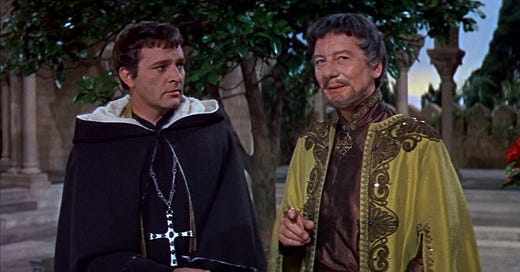Hello, movie lovers!
Welcome to my monthly mini-series titled "One Scene Wonders," where I spotlight a remarkable performance by an actor who had only one scene or just a few lines. While these actors may not have had substantial roles worthy of an Academy Award nomination, their performances in those brief moments were so impactful that I can't imagine the film without them.
This series has undergone several name changes. I struggled to choose between "Performance in a Minor Role" and "No Small Parts." Ultimately, I settled on "One Scene Wonders (OSW)," as the other two titles didn’t convey the right message. These actors, despite their brief appearances, added depth to the film and truly deserve applause for their contributions; because they were truly a wonder to behold.
For this month's OSW, I would like to posthumously nominate John Gielgud for his role as King Louis VII in Becket (1964).
To provide some context, *Becket* explores the relationship between King Henry II, portrayed by Peter O'Toole, and his longtime friend and court facilitator, Thomas Becket, played by Richard Burton. Henry appoints Becket as the Archbishop of Canterbury, believing that his old friend will remain loyal to the crown and support him in all matters against the Church. However, Becket undergoes a transformation and chooses to align himself with the Church, opposing the king's wishes. This decision ignites an epic confrontation between the two men and highlights the ongoing power struggle between the crown and the Church.
Peter O'Toole and Richard Burton deliver an exceptional performance in this movie. It's one of the best written scripts I've ever seen and this movie is worth your attention. To say this movie is queer-coded is an understatement. It's giving 12th century Brokeback Mountain. King Henry obsessed with Becket, who appears to have rejected his affection.
As tensions rise, the two men find themselves on opposing sides when a priest is accused of having sexual relations with a young girl. This priest is seized and killed by one of Henry's lords. In his role as Archbishop, Becket excommunicates the lord who acted against the priest, refusing to grant him absolution. Furious, Henry devises a plan to remove Becket from his position as Archbishop by accusing him of stealing from the King's treasury while he served as Lord Chancellor. In response, Becket escapes to France with the intention of traveling to the Vatican to petition the Pope for a trial. This is where John Gielgud enters the story.
King Louis VII of France: “My dear man, crowned heads are free to play a little game of courtesy, but nations owe one another none.”
Emissaries were sent to France to retrieve Becket. However, King Louis VII not only refused to hand Becket over but also kept the emissaries waiting for three days before granting them an audience. This was after they had spent two weeks crossing the English Channel. King Louis' pettiness can only be rivaled by that of Kendrick Lamar. When the emissaries confronted him about the delay, he shifted the blame onto one of his aides, who was standing right there looking shocked. In what can only be termed a power move, King Louis held this meeting while being fitted by his tailor and playing chess with his staff, barely giving his diplomatic guests his attention.
King Louis VII of France: “The King of England and his Ambassadors can drown themselves in what they are impertinent enough to call their English Channel.”
John Gielgud perfectly embodies this role with a wonderfully flamboyant performance. His wit and delivery shine, offering some of the best dialogue in the entire movie. While King Henry may hold the diva title in England, King Louis certainly claims it in France! This richness of this character is all down to Gielgud's talent.






